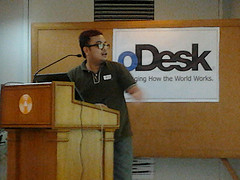Archive for the ‘internet usage’ Category
Friday, February 28th, 2014
 Online success has led to talks of expansion for Anna Blandford and Gareth Meney of Able and Game.
Online success has led to talks of expansion for Anna Blandford and Gareth Meney of Able and Game.
Blandford, from Melbourne, has been selling cards and stationary from Able and Game for four years and proudly names Nepal as a country she sells to.
“We now wholesale to the UK, US and New Zealand,” she said. “We are always looking at expansion and have recently attended trade shows in the UK.”
The reach of the internet allows her and other Australian small business owners online to count the entire world as their market.
To read more about this story, click here.
Tags: Able and Game, Australia, business, cards, homemade, online
Posted in Australia, business, E-mail & the internet, internet usage, online business, Online Sales, online shopping, online stores, selling online, Success story | No Comments »
Friday, February 21st, 2014

Photo credit; Beads for Beds on Flickr
For Kirsten Devitt, starting a business was a dream come true, but she couldn’t have done it without the power of online retail.
“Once you’re online, you can build your confidence slowly,” says Devitt, who is from Brisbane, and who sells handmade jewellery from her store EachToOwn.
About two years old, Devitt’s online business allows her to earn a decent income while caring for her young son. But she would never have considered becoming a business owner if she had to start with a physical store, a staff and a business loan.
“There is too much at stake in owning a store,” she said. “I couldn’t afford to outlay a crazy amount of money for something that might fail.”
To read more about this story, click here.
Tags: Brisbane, EachToOwn, Etsy, handmade jewelry
Posted in Australia, business, E-mail & the internet, internet usage, online business, Online Sales, online shopping, online stores, selling online, Success story | No Comments »
Thursday, February 20th, 2014

Photo credit; Marc Falardeau on Flickr
Conservative US think tank The Heritage Foundation has named Australia as third freest nation in which to do business, putting the country behind Hong Kong and Singapore, and above New Zealand and Taiwan in fourth and fifth place.
”With an economy that benefits from sound fundamentals including monetary stability, low public debt, and a vibrant employment market, Australia has weathered the global economic uncertainty well,” the Foundation said.”Openness to global trade and investment is firmly institutionalised, supported by a relatively efficient entrepreneurial framework and a well-functioning independent judiciary.”
The US dropped from the world’s 10th to 12th freest of the 186 nations surveyed.
Heritage Foundation analyst Bryan Riley said that while in the organisation’s view Labor’s stimulus package during the global financial crisis had been a negative, Australia’s bipartisan commitment to free trade and support for foreign investment, as well as its relatively low tax rates, were enough to keep it near the top.
To read more on this story, click here.
Tags: Australia, business, free, Hong Kong, New Zealand, online, Singapore, Taiwan, The Heritage Foundation, United States, USA
Posted in Australia, business, E-mail & the internet, Federal Government, internet usage, online business | No Comments »
Monday, February 17th, 2014

Photo credit; Lydia on Flickr
The Business Spectator’s Robert Gottliebsen has predicted that as the race heats up between Australia Post, Toll, Linfox and DHL for parcel delivery of online purchases, online retailers will benefit from the competition.
Currently, Australia Post holds a whopping 80% of the market, but the other players are making their run, Gottliebensen says.
He also predicts that brick and mortar shopping centres are in for a rude awakening as online sales continue to grow.
“As the online industry moves to ten per cent and higher proportions of the retail trade, economies of scale will kick in and drive online market share even further. Australia has been a major investor in shopping centres and I don’t think that the overall shopping centre industry fully appreciates the magnitude of what is going to hit them,” Gottliebsen says.
To read more on this story, click here.
Tags: Australia Post, business, DSL, Linfox, online, Toll
Posted in Australia, business, E-mail & the internet, Federal Government, internet usage, online business, Online Sales, online shopping, online stores, selling online | No Comments »
Wednesday, February 12th, 2014

Photo credit; SEOPlanter on Flickr
More Australians continue to to turn toward online shopping, according to a study done by the ARC Centre of Excellence for Creative Industries and Innovations and Swinburne University of Technology as part of the World Internet Project (WIP).
The study looked at online purchasing habits between 2007 and 2013 and found that three out of 10 Aussies shop online at least once per week now.
“After an apparent plateau between 2009 and 2011, our latest survey confirms that online shopping by Australian consumers grew strongly again between 2011 and 2013,” said Dr Scott Ewing of the centre and Swinburne University of Technology.
The average number of online purchases by Australians grew 46.2 per cent from 2011 to 2013, and the monthly value of average purchases grew 5.8 per cent, to $218.
Men spend more online, averaging $229 a month, while women on average spend $204.
“The good news for Australian businesses is that local retailers are maintaining their share of this growth as Australian consumers maintain their strong preference for shopping with domestically based websites,” Dr Ewing said.
“Three out of 10 Australians now shop online every week, or more often, compared with two in 10 New Zealanders and one in 10 Swiss.
To read more on this story, click here.
Tags: Australia, business, customers, online, shopping
Posted in Australia, business, E-mail & the internet, internet usage, online business, Online Sales, online shopping, online stores, selling online | No Comments »
Friday, January 3rd, 2014

Photo credit; Snap on Flickr
Freelancer.com founder Matt Barrie has been named a business winner on Yahoo! Finance Australia’s list of business winners and losers for 2013.
Barrie enjoyed one of the year’s most successful IPOs when shares in the online freelancing network shot as high as $2.60 on their first day.
Coming off a 50 cent issue price, the Freelancer frenzy briefly made the company a billion-dollar concern.
Barrie holds 46% of the company and, even with Freelancer shares now trading around $1.30, his stake is still worth approximately $260 million.
To read more on this story, click here.
Tags: Australia, business, Freelancer.com, IPO, Matt Barrie, online, Yahoo!
Posted in Australia, business, E-mail & the internet, internet usage, investment, online business, Success story, technology, web-based | No Comments »
Wednesday, January 1st, 2014

Photo credit; Alisa on Flickr
Online freelance agency oDesk.com, which recently merged with rival Elance.com, is considering opening an office in Australia to compete with Australia-based Freelancer.com.
Matt Cooper, oDesk’s vice-president of its international division, said Australia was now the company’s second-largest market globally with more than 50,000 registered clients. He also mentioned that oDesk, which is based in Silicon Valley, has twice the penetration rate in Australia as compared with its home market of the US.
To read more on this story, click here.
Tags: Australia, business, Freelancer.com, oDesk, online
Posted in Australia, business, E-mail & the internet, internet usage, online business | No Comments »
Monday, December 30th, 2013

Photo credit; Umstwit on Flickr
The Keane family started their organic fruit and vegetable delivery business, Keane’s Organic Food almost by accident in 2008 and thanks to a cleverly designed website, it’s been growing ever since.
Melissa Keane, a former marketing executive at the University of South Australia, runs the business with her husband Simon, a former South Australia Police detective and their daughter Millie.
The couple set up the business in 2008 as a part-time co-operative venture, sourcing and delivering organic produce in bulk for a few neighbours in the Unley area.
“I’ve always eaten organic food for its nutrition and taste, but when I was pregnant I wanted to find an easier way to purchase it in bulk and did a simple letterbox drop in my street to see who was interested in a co-op arrangement,” Melissa says. “The demand among other mums was clearly there, and before we knew it our business was born. In the past three years alone, sales have increased threefold and we’ve now employed two part-time delivery drivers to support our growth into new regions.”
Most of the orders come from mums who have little time and some older people.
Growing demand through mostly word-of-mouth referrals led to the more formal set up as Keane’s Organic Food, which now delivers to multiple regions within South Australia.
To read more about this story, click here.
Tags: Adelaide, Australia, business, Keane's Organic Food, online, South Australia
Posted in Australia, business, E-mail & the internet, innovation, internet usage, online business, Online Sales, online shopping, online stores, selling online, Success story, technology | No Comments »
Friday, December 27th, 2013
 EcommerceBytes Contributing Editor Greg Holden tells you all you need to know about WooCommerce in an editorial piece he wrote about it.
EcommerceBytes Contributing Editor Greg Holden tells you all you need to know about WooCommerce in an editorial piece he wrote about it.
In the editorial, the tech editor talks about how WooCommerce is specifically designed to work with WordPress, which is great for helping to monetize a regular blog or website.
To read Holden’s full review of WooCommerce, click here
Tags: Australia, business, EcommerceBytes, Greg Holden, online, wordpress
Posted in Australia, business, E-mail & the internet, internet usage, online business, Online Sales, online shopping, online stores, selling online, Woo extensions, Woo Plugins, WooCommerce, WooCommerce Extensions, WooCommerce Themes | No Comments »
Wednesday, December 25th, 2013

Photo credit; elhombredenegro on Flickr
Companies with an online presence need to look beyond conventional insurance policies to ensure they are protected against more than just cyber attacks, a new report from the Centre for Internet Safety (CIS) has warned.
The University of Canberra-based thinktank warned in the report that many organisations are unprepared to manage risk from a variety of factors beyond simple cyber-attacks. Negligence and human factors accounted for 35% of data breaches in one recent Ponemon Institute-Symantec study, while 29% were due to system glitches and the remainder due to the stereotypical malicious attack.
“Traditional business insurance policies have tended to only cover ‘tangible’ assets such as PCs, laptops and other mobile devices,” the report warns.
“Developing exposures have highlighted that electronic data is not always considered to fall under the definition of tangible assets and is just one area where cyber insurance is designed to fill a gap. Some organisations have discovered gaps in what is and isn’t covered after an attack. Unfortunately for them, by then it is too late.”
The report identified five key issues organisations needed to consider in assessing their cyber risk:
- identifying the organisation’s tangible assets
- evaluating its ability to survive without them
- establishing whether it is principally a business-to-business or business-to-consumer operation
- evaluating the burden of managing fully automated IT systems
- assessing the privacy and data breach laws for the markets where it operates.
Companies need to make sure their insurance regimes also cover the ancillary effects of a data breach and its aftermath.
These include:
- cover for business interruption
- the cost of notifying customers
- the cost of regulatory investigations or actions in the event of a breach, “without the requirement for physical damage that is a standard trigger under property policies.”
Other expenses that should be included in cyber-insurance policies include:
- crisis management
- hiring a public relations firm to manage a data breach incident
- forensic analysis
- repairing and restoring computer systems
- the loss of business income resulting from the incident.
“An effective cyber insurance policy will include explicit wording which covers first party and third party claims,” the report advises, warning that the nature and scope of cyber-insurance policies must be managed at the business level and not just by the IT organisation.
The 2012 Data Breach Investigations Report found 570 of 855 recorded attacks were targeted at businesses with 11 to 100 employees.
To read more about this story, click here.
Tags: Australia, business, Centre for Internet Safety, cyber attack, insurance, online, University of Canberra
Posted in Australia, business, cybercrime, E-mail & the internet, internet usage, online business, Online Sales, online shopping, online stores, selling online, technology | No Comments »
 Online success has led to talks of expansion for Anna Blandford and Gareth Meney of Able and Game.
Online success has led to talks of expansion for Anna Blandford and Gareth Meney of Able and Game.







